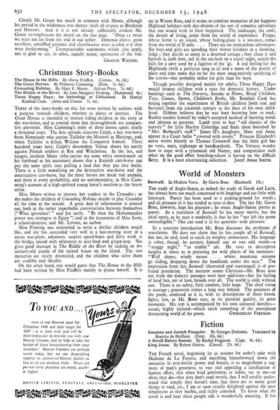World of Monsters
Beowulf. In Modern Verse. By Gavin Bone. (Blackwell. 15s.)
THE study of Anglo-Saxon, as indeed the study of Greek and Latin, has always been too much concerned with language and too little with literature. Poetry has been used as a picking-ground for words ; and all pleasure in it has tended to turn to dust. The late Mr. Gavin Bone, however, kept his pleasure ; he treats Anglo-Saxon poetry as poetry. As a translator of Beowulf he has many merits, but the chief merit, as he puts it modestly, is that he has " not left the poem unintelligible." One can read it in his quatrain, with pleasure.
In a sensitive introduction Mr. Bone discusses the problems of translation. He does not claim that he has caught all of Beowulf, but has, he said, tried to catch its weighty seriousness. His language is sober, though he permits himself one or two odd words—a " scuggy night," " to trinkle " ale. He rises to descriptive heights at times as in picturing the wild places of the monsters: " Wolf slopes, windy nesses . . . where mountain streams go sliding, dropping down the headlands under the mist." The impression from this Beowulf (shortened and rearranged) is of pro- found pessimism. The narrator seems Christian—Mr. Bone does not think the didactic passages were later additions—but the feeling of hard fate, not of love, broods over all. The world is cold, without sun. There is no safety, little comfort, little hope. The chief virtue is courage ; generosity comes a long way behind. The greatness of the poem, confused as it is, with its descriptions of three heroic fights, lies, as Mr. Bone says, in its pictorial quality, its great moments. His text is accompanied by his own coloured sketches— casual, highly stylised—which catch something of the amorphous


































 Previous page
Previous page